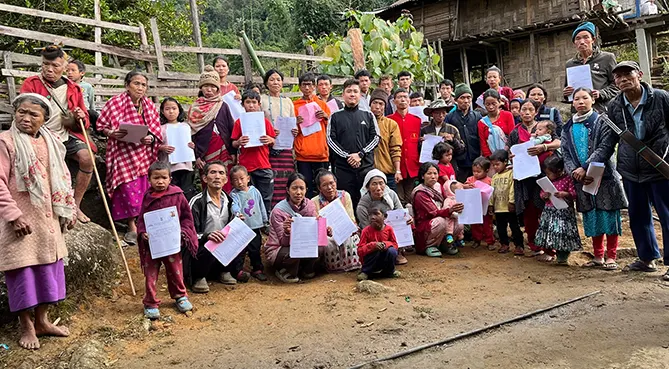Yakli, a remote hamlet situated on the Indian side of the border with China, represents both a physical and cultural frontier. Nestled in Sawa Circle of the Chayangtajo Sub-Division and home to around 150 Puroik people, the village is the last settlement bordering China. The Puroiks are one of the most marginalized indigenous groups in India. Their small population, coupled with their shyness to engage with the modern world, has led to their increasing vulnerability. These mountainous areas, clothed in lush greens and bathed by turquoise river, is undoubtedly picturesque yet beneath this serene beauty lies the harsh and unforgiving reality.
To these all odds and challenges, Yomgam Marde, Circle Officer of Sawa, embarked on a challenging three-hour foot journey on 22nd November, 2024 through the rugged terrain to reach Yakli.
The risk that had been forewarned turned into a grim reality when one of the trek-mates, a teacher at the Government Primary School, Yakli, was bitten by a locally feared venomous snake barta, a type of pit viper. The bite, though potentially deadly, was not immediately fatal due to proper footwear of the teacher. The teacher had to immediately move back to Seppa for emergency medical care. While the teacher was fortunate enough, the situation highlights the broader challenges faced by those who work in such isolated regions. It also serves as a stark reminder of the urgent need for better social infrastructure.
Understanding the importance of personal engagement, the officer spent three full days in the village and immersed himself in the community and made personnel efforts to understand the pressing issues facing the community and sought to explore ways in which the government could extend its support.
As part of the community outreach initiative, he distributed important official documents like the S.T Certificates, Permanent Resident Certificate, and Birth Certificates etc. The officer opined that due to the absence of these formal and legal identification, the Puroiks are bereft off critical government services, including social security benefits, healthcare and educational opportunities, which are vital for community upliftment.
The officer also documented the Puroik community’s dependence on Rangbang/Tassa (Sago Plant) for food source. As such the community’s dependence on nature for sustenance underscores the vulnerability of the Puroiks to environmental shifts, particularly climate change and ecological degradation, which could disrupt their access to these resources. The Puroiks’ reliance on natural resources for food, as per the officer, highlights the need for sustainable support systems to buffer against these environmental changes.
CO Sawa also visited the lone government school in Yakli to motivate the students. He also interacted with various stakeholders and highlighted the significant challenges posed by global warming and its detrimental impact on the food habits of the Puroik community. To address these environmental challenges, the officer encouraged the villagers to increase the plantation and domestication of the Tassa plant. The Tassa plant is well-suited to the local environment, and expanding its cultivation can help in mitigating the impacts of climate change on food security by achieving food self-sufficiency.
Speaking about his visit, the Circle Officer mentioned his longstanding vision to reach out to marginalized communities and to give a practical shape to the concept of governance at the doorstep. He expressed the view that the lifestyle of the Puroiks could be significantly improved by formalizing their traditional ecological knowledge systems by bringing in cooperative societies, such as the ArSRLM, to provide a structured platform for the Puroiks to engage in income-generating activities.
The Tassa plant used widely by the Puroiks, has the potential to greatly enhance the economic prospects through value addition. Products such as Sabik, a gelatinous product, Sakap, a type of chappati made from Tassa, roasted Tassa product Sabiya, Sabo (soupy products), and Tassa noodles can be marketed with the right branding and value addition. These products, if given a facelift in terms of packaging and presentation, can provide a healthier alternative to many commercially available, sugar-laden snacks like biscuits, which are often consumed during tea time. These products offer a healthier dietary option, and hold significant income-generating potential for the Puroiks. This can help to diversify their sources of income and reduce their reliance on Tassa plant alone.
Regions like Yakli, located in the far reaches of the landscape, often remain unnoticed from the glare of mainstream attention due to their geographical remoteness. These areas hold the key to inclusive and holistic vision of development-one that acknowledges and incorporates the needs of even the most remote communities.
The once overlooked regions are finding their place in mainstream consciousness and government’s ongoing efforts to integrate such areas have already brought about meaningful changes. However, this journey of inclusion is far from complete as more deliberate focus on cultural and rural tourism could enhance the region’s integration into the broader national fabric.
By promoting such cultural hotspots, we can create platforms for the world to appreciate the unique ways of life that exist in these remote places. This would bring economic opportunities, preserve cultural heritage, and foster a sense of pride among the locals. And in an era of increasing geopolitical complexities, strategic integration and development of these remote regions could serve as a defence buffer, enhancing the safety and security of the region. (The account has been narrated by Yomgam Marde, Circle Officer, Sawa, and transcribed and edited by David Koyu, APCS, i/c DIPRO, East Kameng)

